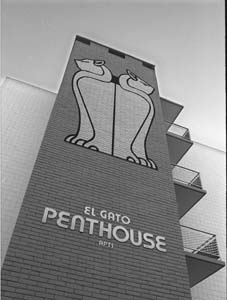Cat Fight
Smoke and Mirrors: Linda Maupin's landlord, Vasona Management Inc., justifies a $450-per-month rent increase by pointing to frills such as closet mirrors, which have been installed to attract corporate clients.
Owners of the tony El Gato Penthouse Apartments think their new shower doors and hall paintings are the cat's meow, and they've infuriated tenants by raising rents 40 percent
By Traci Hukill
NOBODY LIKES the new paintings at the El Gato Penthouse Apartments in Los Gatos. But there they hang, regardless, one every few feet in the cinder-block hallways, bucolic scenes wrought in dime-store oils and framed in gilded plastic.
"It's embarrassing!" exclaims tenant Linda Maupin, rolling her pretty blue eyes. "It's like living in a bad hotel."
The 46-year-old Maupin, who has polio and walks with a pronounced limp, lives in a 600-square-foot apartment jammed with the accumulated artifacts of 17 years. Bookshelves crammed with tomes on metaphysics vie for space with Maupin's beloved plants, her sewing machine and a Grav-i-Tron, a space-program invention that works Maupin's damaged muscles isometrically.
Though the tiny place can barely contain her life, Maupin faces a monthly rent increase of $450--putting her grand total at $1450--unless a group of 20 tenant petitioners prevails against Vasona Management Inc. at an arbitration hearing on Tuesday. If the petitioners lose, they'll have to pay new rents ranging from 40 percent to 70 percent higher than their current rates.
That makes the paintings, which are part of $1 million worth of capital improvements being passed on to tenants in the form of $400 to $600 rent increases, more than just embarrassing. It makes them expensive. The face lift has already transformed 60 of El Gato's 80 units into high-rent suites tailored to the tastes of corporate tenants--professionals relocating to Silicon Valley who need temporary housing, usually on the boss's nickel. El Gato charges $1,750 to $2,150 per month for a furnished one-bedroom unit, and corporate accounting departments, aware of Silicon Valley's severe housing shortage, eagerly sign big checks to keep their soldiers abroad housed and happy.
Monthly disability checks barely cover Maupin's present $1000 rent, and she'll probably have to leave if her tenants group loses this week. "Being on a fixed income is tough," she says. "I have to borrow every month as it is just to get by." Her permanent smile fades a little. "Moving, that's the thing that scares me most. I love Los Gatos. This is a place where I feel really safe."
Like the paintings, many of the changes at El Gato are considered unnecessary and unwelcome by those who are footing the bill. Two floors up from Maupin, Lillian Comastra, a bright-eyed 84-year-old who looks more like 60, sits at her dining room table in a neat, sunny apartment. She finds few of the "improvements" to her liking.
"They put in a new stove," she says, gesturing toward the sleek black Frigidaire range-oven-microwave that replaced the old space-conserving range-microwave combo. "But that used to be a cupboard at one time. I have no room for my pots and pans, so I store them in the oven. And would you believe it"--she opens the dishwasher to reveal an assortment of plastic bags, canned goods and seasoning packets perched among the molded plastic prongs--"I have to store stuff in here!"
The new shower doors aren't so hot either, in Comastra's opinion. "The old ones were fine--they were heavy," she says. "These, they slide open while I'm showering! I have to stuff a washcloth in there." She shakes her head. "They are taking things away from us and giving us things we didn't want."
Comastra's kitchen is tiny but tidy. She keeps her wastebasket on top of the footstool to conserve space and hangs coffee mugs on pegs on the wall. Comastra's apartment is a "junior" unit, one of eight in El Gato. Even so, she already pays almost $900 a month and faces a $450 increase. She thinks she'll have to leave if it passes.
"When I first found out the rents were being raised so high--well, I got anxiety attacks," she explains. "I didn't eat, I couldn't sleep. I still pray every day that we win our case.
"I love it here," she goes on. "I'm near my pinochle club, I'm near my church, my doctor is across the street from here. Everything is so convenient. It would break my heart, really, if I had to leave here."
THE TOWN of Los Gatos has a law preventing drastic rent hikes. The town ordinance prohibits rent increases of more than 5 percent annually, except when capital improvements are made to the property. And even in that case, says Christine Burdick, executive director of the Santa Clara County Bar Association, the ordinance requires that the money expended by the landlord be reasonable and necessary.
"You can imagine," Burdick says, "that with some increases, landlords and tenants disagree on whether the capital improvement was reasonable."
Los Gatos contracts with the bar association to handle rent disputes. The El Gato Penthouse case failed conciliation, an informal process of negotiation that solves most rent disputes. It also failed mediation, whereby a bar association appointee presides over a meeting of the opposing sides. And this Tuesday, the tenant petitioners meet Vasona Management in arbitration to determine if the improvements made to El Gato Penthouse Apartments are reasonable and necessary--and if the pass-through charges themselves are reasonable.
Killian Byrne, property manager for Vasona Management, insists that $1000-a-month rents for El Gato's 600-square-foot apartments aren't that high. He says that even after the increases, rents at El Gato will still be "well below market." Furthermore, he seems to think high rents are a good thing. "It's just a sign of how well the economy in the valley is doing," he says.
We take the elevator to the fourth floor to view one of the corporate units, Byrne pointing out capital improvements all the way. There's new carpeting in the hallways, the lovely paintings, a jacuzzi in the pool area, a fountain in the parking lot. And of course all the units got new stoves.
The sparkling $2,000-a-month apartment we tour bears little resemblance to the ones I've seen downstairs--except that it's exactly the same size. Like Comastra's and Maupin's apartments, this one features mirrored closet doors, a mirrored wall and beveled mirrors in the bathroom. But the carpeting in here is new and plush, not worn and stained like the long-term residents' carpets. Puffy pastel furniture and a glass coffee table dominate the living area, accented by a vase of huge silk flowers in the corner, a compact stereo and a 27-inch TV. Another TV lives in the pastel bedroom behind the mirrored closet door. Byrne proudly shows off the double-paned windows and sliding doors, touted as energy-efficient and noise-muffling.
"These alone ran about $300,000," he says. "This is all really expensive."
But the place is still tiny in spite of the mirrored illusion of spaciousness. The kitchen cabinets are chipped. And residents say that when work crews "retiled" the showers, they merely applied new tile over the old. When Byrne slides open the shower door, it's obvious that the tub needs recaulking.
Byrne continues to list the amenities: maid service twice a month, Free utilities and cable. "We now pay for everyone's cable TV," he says, meaning the long-term residents as well, "whereas before they had to pay for their own."
We move out to the hall and continue our conversation by the elevator. Told that some of the tenants consider a 40 percent increase in rent unreasonable given that their incomes aren't rising by that much, Byrne shrugs. "Yeah, but you'd be surprised by how much wages are going up." He hits the elevator button again. We've been waiting for three or four minutes by now. "What's wrong with this thing?" he snaps. We take the stairs.
"We're only going by the ordinance," he says later. "What you probably haven't heard is that the initial increases the residents received were less than the rent-control ordinance allowed us. We didn't pass through all the improvements we could have." I ask to see documentation to this effect, but Byrne says it's confidential until the arbitration process is over.
DICK PORTER likes things organized. As one of three people spearheading the effort to fight the rent increase, he is today in possession of a thick white binder labeled El Gato Penthouse Apartments Rent Protection Petitioners Notebook, and he opens it carefully on a table in his Sunnyvale office.
"Our issue here is that there is a rent-control ordinance in Los Gatos," he says. "It specifically states that its intended purpose is to prevent unreasonable rent increases. Now, I consider 5 percent reasonable. I consider 10 percent unreasonable, because my pay isn't going up that much. I certainly consider 40 percent unreasonable."
Porter turns to a spreadsheet that he received along with notice of his rent increase in May. It details $17,000 in increased advertising costs for El Gato Penthouse over the past year, a $24,000 increase in utilities and more than $1 million in capital improvements. "What's happened to them now is that under the corporate agreement they pay the utilities," he surmises. "So they're passing along the utility costs to us. And all the advertising they're having to do now to keep those units filled--that's expensive."
He notes that the old stoves were working just fine, that the closet doors didn't need mirrored surfaces and that the old radiant heat system, which was thermostat controlled, has been replaced by a heating function on the air conditioning units that doesn't work as well and isn't supposed to be used as a primary heat source in the first place. "So there's actually been a decrease in habitability," he says.
Porter then produces a rent survey his group conducted showing that a one-bedroom apartment in Los Gatos averages 825 square feet and costs $1,114 a month. He believes Vasona Management could recover its construction costs simply by passing through charges to the corporate tenants--which it's already doing by charging $2,000 per unit. "Even at 50 percent vacancy," he says, "they could amortize their cost in less than four years."
Porter has tried to get city attorney Orry Korb involved to no avail. And last Monday he and another petitioner raised the issue at a Town Council meeting--again, to little advantage. Clearly it's up to the petitioners to carry their own water on this one.
"Oh, I can afford the increase," he says, waving his hand, "but it's the principle of the thing! To them it's just a business issue. But to us, it's our homes. It's where we go to retreat after being out in the world."
[ San Jose | Metroactive Central | Archives ]
![]()

Christopher Gardner Towering Inflation: Barred by local ordinances from raising rents arbitrarily, the owners of the El Gato Penthouse Apartments made $1 million worth of "improvements" that tenants didn't want.
Towering Inflation: Barred by local ordinances from raising rents arbitrarily, the owners of the El Gato Penthouse Apartments made $1 million worth of "improvements" that tenants didn't want.
From the November 12-18, 1998 issue of Metro.
![[Metroactive News&Issues]](/gifs/news468.gif)